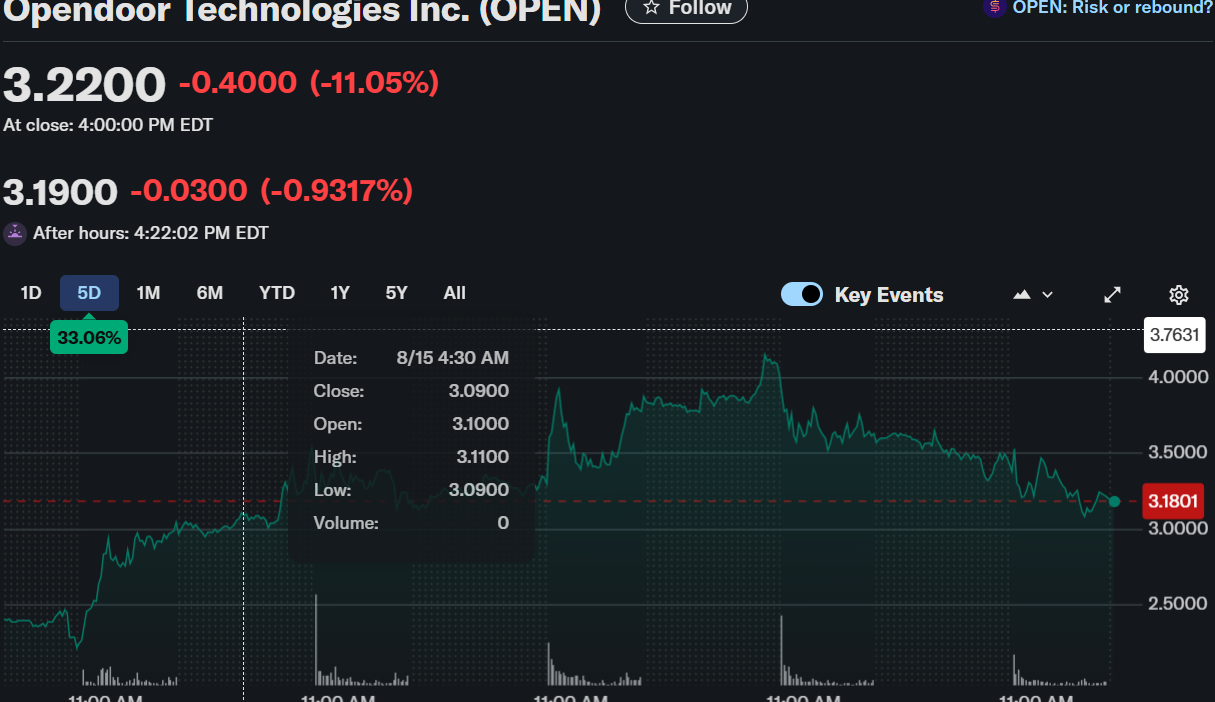Opendoor Technologies Inc. ($OPEN) Stock Plummets as Inflation Fears and AI Disruption Concerns Intensify
Wall Street's latest casualty just got caught in the crossfire of two market-shaking forces.
Inflation's Grip Tightens
Rising consumer prices aren't just squeezing household budgets—they're hammering proptech valuations as mortgage rates spike and housing demand cools. Opendoor's instant-offer model faces its toughest stress test yet.
AI Anxiety Spreads
Automated valuation algorithms suddenly look vulnerable as market volatility exposes their training data limitations. When machines can't predict human economic behavior, even the slickest tech platforms hit turbulence.
Another 'disruptor' learns the hard way that when the Fed hikes rates, reality bites harder than any algorithm can calculate. Welcome to the grown-ups' table, fintech.
TLDR
- Opendoor stock fell 14% on Wednesday after inflation and AI-related concerns pressured growth stocks.
- The decline follows a sharp 333% rally in the past three months.
- MIT report suggests 95% of businesses see little value from generative AI investments.
- Leadership changes and meme-stock momentum continue to drive speculative trading.
- Despite gains this year, OPEN remains down 91% from 2021 highs.
On August 20, 2025, Opendoor Technologies (NASDAQ: OPEN) stock traded at $3.09, down 14.42% in afternoon trading as of writing.

Opendoor Technologies Inc. (OPEN)
The sharp decline came after an explosive rally over the past week, which had lifted shares by more than 333% in the last three months. Despite the sell-off, momentum-driven investors have kept Opendoor in the spotlight, viewing it as a speculative play with potential upside.
The real estate platform has become a favorite among meme-stock traders, with Optimism heightened by recent leadership changes. CEO Carrie Wheeler announced her decision to step down, sparking further speculation about the company’s direction under new management.
Inflation and AI Market Pressures
Broader market conditions added to the sell-off. Inflation concerns resurfaced following last week’s Producer Price Index report, which revealed higher-than-expected price pressures. Large retailers, including Home Depot and Target, reinforced the warning signs by suggesting inflation may soon hit consumer spending more directly.
At the same time, new research from the Massachusetts Institute of Technology (MIT) cast doubt on the commercial benefits of generative AI. The study indicated that 95% of businesses are not gaining meaningful returns from their AI investments, creating valuation headwinds for technology and growth-focused companies.
These external factors weighed heavily on Opendoor’s stock, despite no direct negative company-specific developments.
Meme-Stock Status and Speculative Interest
Opendoor’s recent surge has been compared to Carvana’s sharp rebound, with some investors betting on a similar turnaround story. EMJ Capital founder Eric Jackson has been among those voicing bullish commentary, fueling optimism.
The stock remains an extremely high-risk investment. Shares are still down 91% from their 2021 peak, underscoring the volatility surrounding the business. The combination of speculative interest, leadership shifts, and macroeconomic uncertainty continues to drive dramatic swings in valuation.
Long-Term Performance Outlook
Despite this year’s strong gains, Opendoor’s long-term track record highlights the challenges ahead. The company’s trailing three-year return sits at -34.78%, while its five-year return is down 71.26%. By comparison, the S&P 500 has delivered robust gains of 50.75% over three years and 88.29% over five years.
On a shorter timeline, however, the stock has impressed. Year-to-date returns are up 93.62%, and one-year returns stand at 59.28%, far ahead of the broader market. This divergence reflects both the allure and the danger of treating Opendoor as a momentum-driven play.
Opendoor’s stock remains a battleground between bullish meme-driven speculation and bearish macroeconomic realities. With inflationary pressures rising and doubts surrounding AI’s near-term value, investors should brace for continued volatility in the months ahead.

